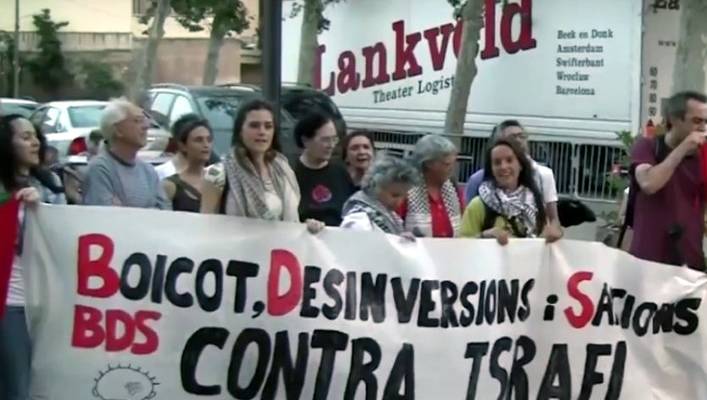Pushed by far left-wing politicians, BDS has made inroads in Spanish municipalities, but pro-Israel activists end the anti-Israel motions in the court of law.
By: Shiri Moshe, The Algemeiner
A “wave” of municipal resolutions hostile to Israel have passed in Spain in recent weeks, following riots in the Gaza Strip and changes in the Spanish political landscape.
The latest declaration, approved by the City Council of Pamplona last Monday, calls on the Spanish government and European Union “to impose an immediate military embargo” on Israel, and blacklists all the country’s officials as “persona non grata” in the city.
The measure passed with the support of Basque nationalist factions and the far-left anti-austerity Podemos party, with the conservative Navarrese People’s Union standing in opposition. The Socialist Party of Navarre — a branch of Socialist Workers’ Party (PSOE) — abstained.
The PSOE has helmed the Spanish government since earlier this month when it led the ouster of conservative Prime Minister Mariano Rajoy with a no-confidence vote. Its minority government is reliant on the support of Podemos — the third-largest party in parliament — as well as Basque and Catalan secessionists.
Yet before assuming power, the PSOE supported a measure passed in May by the autonomous province of Navarre, which called on the Spanish government to break ties with and sanction Israel over its “criminal repression of the Palestinian population.”
Advanced by activists from Podemos, the declaration expressed support for the “right of return” of Palestinian refugees of the 1948 Arab-Israeli War and their five million descendants to Israel. It also endorsed the “Great Return March” led by the Palestinian terrorist group Hamas near Gaza’s border with Israel, which drew international attention on May 14 after more than 60 Palestinians — the majority claimed by Hamas and Palestinian Islamic Jihad as members– were killed by Israeli troops.
While some Palestinians were filmed throwing firebombs, burning tires, and flying flaming kites during the riots — and the IDF released footage of Hamas gunmen trying to enter Israeli territory — the Navarre resolution described them as “peaceful.”
Aggressive BDS Advocacy
The clashes are seen as one of the main drivers behind what the boycott, divestment, and sanctions (BDS) campaign in Spain called a “wave” of municipal resolutions against Israel, which recently passed in Madrid, Barcelona, Valencia, Terrassa, and Badalona.
The measures were brought forward with the support of Podemos, which started aggressively advocating for BDS when it first gained access to municipal power after the 2015 elections, the head of the Spanish pro-Israel group ACOM told the Algemeiner.
Formed in 2014 by Pablo Iglesias, a former adviser to late Venezuelan president Hugo Chávez, the party has been accused of receiving funds from Iran and Venezuela, though Spain’s Supreme Court has rejected opening a criminal investigation into the allegations. Iglesias — who serves as a host of the show Fort Apache on HispanTV, a Spanish-language news channel owned and operated by Iran — has denied any wrongdoing.
He previously addressed the seeming paradox of espousing progressive politics while working at a TV station operated by an Islamic theocracy, whose female presenters are required to wear headscarves, by noting, “the Iranians are interested in the spread of a leftist discourse in Latin America and Spain because it affects their opponents. … For me, whoever does politics has to assume contradictions, and we are willing to ride them.”
The Podemos chief, who in a TV interview earlier this month called for firmer action against “an illegal country like Israel,” oversees a party whose leaders maintain “anti-Israelism at the very core of their priorities,” said ACOM president Angel Mas.
Guided by Ramallah
The group’s campaign found a notable degree of success on the municipal level in recent years.
“In Spain there are tens of groups and brands, many of them empty shells with the sole purpose of attracting legitimacy and public funding, coordinated by another … shell that receives direct guidelines from Ramallah,” Mas explained.
To date, “about 100 local governments — municipalities and provinces — have adhered to BDS,” he continued. “So far, we prevented many of them from voting the motion, explaining the real motives of the BDS campaign and advising of the legal consequences — for the municipality and personally for the city councilors — of doing so.”
“When we failed, we presented cases to the Spanish courts,” Mas noted. “So far we have won 33 cases … and lost none.”
Among these are two high court rulings in 2016 and 2017 that found BDS amounted to unconstitutional discrimination.
Nonetheless, Mas — who was sued earlier this year by the Committee for Solidarity with the Arab Cause, which accuses him of inciting hatred and intimidating Spanish municipalities with threats of legal action — warned that the anti-Israel motions can have significant implications.
“When they are passed all municipal documents [bear] the BDS seal, municipal companies and related interests are informed and instructed, posters are distributed for the retailers in the city,” he said. “It aims at creating a true Juddenfrei area where you would walk into a restaurant that says in its door ‘this is a space free of Israeli apartheid.’ Everybody understands this is a euphemism for ‘Jews are not welcome here.’”
High Level of Misinformation and Bias
Mas indicated the motions are not only aimed at Israel, “but also against any Spanish citizen associated or sympathetic to the Jewish state.”
“If I were to deal personally with any of those municipalities they would demand from me a public rejection and denunciation of Israel as a genocidal state,” he said.
While Spain has previously come under scrutiny for its “widespread” funding of groups that support the BDS campaign, Israel remains “an afterthought for the Spanish public opinion,” Mas observed.
“But the level of misinformation and bias from academia, arts and media is very large,” he added. “BDS positions itself as a humanitarian movement and it is important to unmask them for what they really are.”
